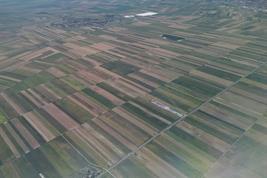14.08.2024

The "Provision of Ecosystem Services" working group in Research Area 2 "Land Use & Governance" is exchanging knowledge with the Maize Research Institute Zemun Polje (MRIZP) in order to develop climate change-adapted agroecological cultivation methods for agriculture.
Although the consequences of prolonged periods of heat and drought are already a challenge for agriculture in Germany, there are countries in Europe where extreme weather events and heat waves are much more severe.
While the average temperature for maize and soybean vegetation period gradually increased (from 16.5 °C to 21.0 °C for the period 1991 to 2023 at Zemun Polje, Belgrad location) precipitation amount tend to be stable of about 350 mm. Nevertheless, precipitation amounts were distributed unequally over crop growing period, similarly to the situation in Germany, with dominance of dry periods, particularly during maize anthesis, including maize and soybean grain filling period. At the same time, obtained changes are favourable for a rapid spread of aggressive weed species and pests. Thus, maize and soybean dry farming become even more challenging in Serbia. Frequent dry periods in October and November also affect germination and sprouting of small-grain cereals. Accordingly, it is required to transform and apply more resilient models of agricultural production in Serbia.
The MRIZP is a government-funded institute developing maize, soybean, and small-grain cereals cultivars with a high-yielding potential for different growing conditions, purposes and needs. The gene bank of MRIZP disposes of more than 5,000 accessions of local and introduced maize genotypes, whereby the institute is doing plant breeding and seed production research. For the successful introduction to new cultivars on the agricultural market, MRIZP is constantly working with field trials to develop conventional and organic crop production systems under diverse agro-ecological conditions during the cultivation.
The ZALF-MRIZP cooperation network brought together scientists from the fields of agronomy and agroecology in Belgrade at the beginning of August to discuss joint research potential and cultivation strategies for maize, grain legumes and cereals in the field. Under the leadership of Prof. Sonoko Bellingrath-Kimura, Dr. Milena Simic and Dr. Vesna Dragicevic, Dr. Richard Omari, Tsvetelina Krachunova, Dr. Milan Brankov and Natalia Pavlovic will investigate synergies between plants and soil organisms in the coming vegetation period. The focus will be on weed diversity and management on the cultivation areas under climate change conditions. In addition, various weed communities will be analysed for their effect on plant physiology, grain quality and biomass. Another research topics being developed in the collaboration are various crop rotation, tillage and fertilisation systems for grain maize and maize for silage for climate change adaptation and their effect on soil C concentration and CO2 emissions, as well as the cultivation of soybeans with novel inoculants in various crop rotation designs.
Further Information:
- Maize Research Institute Zemun Polje:
https://mrizp.rs/
MRIZP contact persons: - Dr. Vesna Dragicevic
Senior Researcher
vdragicevic@mrizp.rs - Dr. Milena Simic
Stellvertretende Direktorin
smilena@mrizp.rs
